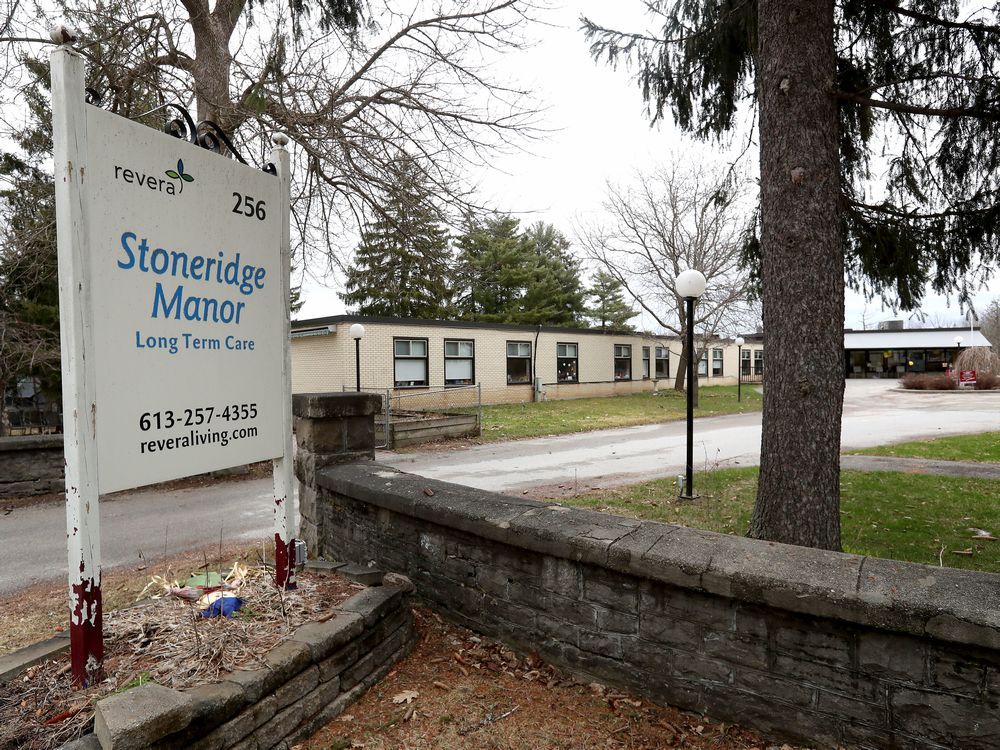BRACING FOR THE WORST: Ottawa LTC homes prepare after Almonte, Carleton Place outbreaks
Posted: April 11, 2020
(April 10, 2020)
By: Aedan Helmer, Edmonton Sun

Stoneridge Manor long-term care home in Carleton Place.
Facilities in the national capital region have been preparing for the best-case scenario while bracing for the worst.
After the devastating COVID-19 outbreak at Almonte’s Country Haven long-term care facility claimed the lives of 10 seniors, with 20 more residents infected, another retirement community in Carleton Place has reported nearly half its vulnerable population of seniors have been infected with coronavirus.
Stoneridge Manor Long Term Care Home, the 60-bed facility on High Street in the town of 12,000 west of Ottawa, has reported 28 residents and 18 staff members have tested positive for the potentially deadly virus.

Stoneridge Manor long-term care facility in Carleton Place.
“The residents are in isolation and the staff members are in self-isolation at home,” according to a statement from Dr. Rhonda Collins, chief medical officer with Revera, which operates the home in Carleton Place and several others in Ottawa, two of which have also recently reported outbreaks.
The outbreaks in those two Ottawa retirement homes — Montfort long-term care home on Montreal Road and Carlingview Manor on Carling Avenue — have involved one infected staff member.
“We are monitoring residents and screening staff (at both homes) for symptoms of COVID-19. All residents are being isolated in their units,” said Collins, who said staff were wearing masks at all times and those providing care to residents with respiratory symptoms were using “droplet precautions PPE (surgical mask, shield, gown, gloves).”
Ottawa Public Health on Thursday reported outbreaks at 13 health-care institutions and long-term care facilities in Ottawa, including units of The Ottawa Hospital’s General and Civic campuses and one unit of the Montfort Hospital.
OPH also listed eight retirement homes, including Montfort and Carlingview, reporting facility-wide outbreaks. Others include Promenade Retirement Residence, where three residents have died from coronavirus, Manoir Marochel, Garden Terrace, Maplewood Retirement Community, Park Place and Madonna Care Community.
Weeks before Ontario’s Thursday announcement toughening testing and protection requirements in long-term care facilities — with outbreaks (at least one case reported among staff or residents) at more than one in 10 homes in the province and with data showing deaths in long-term care homes accounting for almost half of all of Ontario deaths linked to COVID-19 — facilities in Ottawa have been preparing for the best-case scenario while bracing for the worst.
At the Salvation Army’s Ottawa Grace Manor, the home for 128 seniors went into outbreak protocol four weeks before being directed to do so, with strict measures, no ins and outs and all staff restricted to one facility to avoid potential cross-contamination, spokesman Glenn van Gulik said.
One staff member was tested after “feeling under the weather” and results came back negative, van Gulik said, while two residents had also tested negative.
Extendicare, which operates five facilities in Ottawa and cares for 944 residents, said in a statement Friday that concerns over COVID-19 had “resulted in some staffing challenges and we are deeply appreciative of our team members who continue to respond to the needs of our residents by providing high-quality care … We are doing all we can to prevent further spread of this virus among our residents and staff.”
Extendicare said one staff member tested positive after returning from travel abroad, was in self-quarantine and had not attended work since arriving back in Canada. There have been no positive cases reported among any residents at Extendicare homes.
Facilities have been closed to non-essential visits and had implemented enhanced cleaning and screening measures, taking temperatures and checking for symptoms of residents and staff twice daily.
At the Perley and Rideau Veterans’ Health Centre, with a 450-bed capacity, the staff or more than 850 “meet or exceed all Ministry staffing standards for long-term care and short-stay care,” director of communications Jay Innes said.
All vacant long-term care and short stay beds are “reserved pending the admission process,” Inslee said, as the residence “is following ministry guidance on welcoming new admissions during this pandemic.”
All new admissions at Bruyère long-term care homes are placed in preventative 14-day isolation for monitoring in case they develop symptoms, with some bed space reserved to allow for new admissions to be placed in isolation upon arrival.
“Everyone’s having longer days,” said Barbara Duggan, director of quality management with the Glebe Centre, with staffing restrictions meaning longer shifts for staff and with nurses on staff around the clock, supervisors and personal support workers in each unit in the home to 254 seniors.
“One of many lessons we will hopefully have learned from this crisis,” Duggan said, “will be the most important role of the front-line workers in long-term care, how they stand like heroes against a virus threatening to invade their homes and their residents, how they work to exhaustion to sanitize, to ensure best practices are optimized and then to allay the worries of residents locked in and families locked out.
“When we speak of heroes and rightly describe those at the front lines of hospitals, paramedics, fire and police, we must include long term care,” Duggan said, “the guardians of the elderly.”
The Ontario Health Coalition said Thursday it was “deeply concerned” that the new provincial measures wouldn’t be enough to stop the spread of COVID-19 to long-term care homes or to stem existing outbreaks.
There had been 86 deaths at Ontario long-term care facilities as of Thursday, according to figures cited by OHC, constituting half the provincial total of COVID-19 fatalities, yet residents in long-term care represented less than one per cent of the provincial population.
The OHC called for concrete measures to support a front-line workforce “that has held the system together through crisis-level staffing shortages prior to COVID-19 and now with even more critical shortages as the virus spreads through the homes with devastating speed.”
Click here for original article


